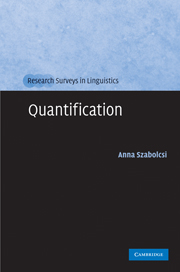Book contents
- Frontmatter
- Contents
- List of figures
- List of tables
- Acknowledgements
- 1 What this book is about and how to use it
- 2 Generalized quantifiers and their elements: operators and their scopes
- 3 Generalized quantifiers in non-nominal domains
- 4 Some empirically significant properties of quantifiers and determiners
- 5 Potential challenges for generalized quantifiers
- 6 Scope is not uniform and not a primitive
- 7 Existential scope versus distributive scope
- 8 Distributivity and scope
- 9 Bare numeral indefinites
- 10 Modified numerals
- 11 Clause-internal scopal diversity
- 12 Towards a compositional semantics of quantifier words
- Notes
- Bibliography
- Index
8 - Distributivity and scope
Published online by Cambridge University Press: 05 June 2012
- Frontmatter
- Contents
- List of figures
- List of tables
- Acknowledgements
- 1 What this book is about and how to use it
- 2 Generalized quantifiers and their elements: operators and their scopes
- 3 Generalized quantifiers in non-nominal domains
- 4 Some empirically significant properties of quantifiers and determiners
- 5 Potential challenges for generalized quantifiers
- 6 Scope is not uniform and not a primitive
- 7 Existential scope versus distributive scope
- 8 Distributivity and scope
- 9 Bare numeral indefinites
- 10 Modified numerals
- 11 Clause-internal scopal diversity
- 12 Towards a compositional semantics of quantifier words
- Notes
- Bibliography
- Index
Summary
The goal of this chapter is to discuss how distributive readings come about in a rather wide variety of phrases. §8.1 starts out with an introduction to the collective vs. distributive distinction, with special reference to events. §8.2 considers plural definites and indefinites, including those modified by all or both, and conjunctions with stressed or unstressed and. §8.3 scrutinizes distributive singulars like every NP, each NP, and many a NP. It is argued that in both the plural and the singular cases the source of distributivity is an operator external to the DP (modulo some poorly understood quantifiers).
§8.4 considers another facet of distributivity: NP-pluralization. It zooms in on anti-quantifiers, from binominal each in English to reduplicated numerals in Telugu, and argues that they all are instances of distribution involving a set of events as the sorting key.
Finally, §8.5 raises the question, largely open as of date, as to the division of labor between Skolemization and event-key distribution as sources of referential dependency.
Background notions: sorting keys, distributed shares, and events
Barwise and Cooper (1981) define all semantic determiners as relations between sets of atomic individuals. Here distributivity is not a separate aspect of the interpretation of quantifiers: all quantifiers are construed as distributive, and the domain of their distributivity automatically coincides with their scope. As was pointed out in Chapter 5 however there is nothing “anti-GQ-theoretic” in assuming that individuals are not atomic but may have a part-whole structure, or in replacing individuals with sets in the domain.
- Type
- Chapter
- Information
- Quantification , pp. 109 - 140Publisher: Cambridge University PressPrint publication year: 2010



